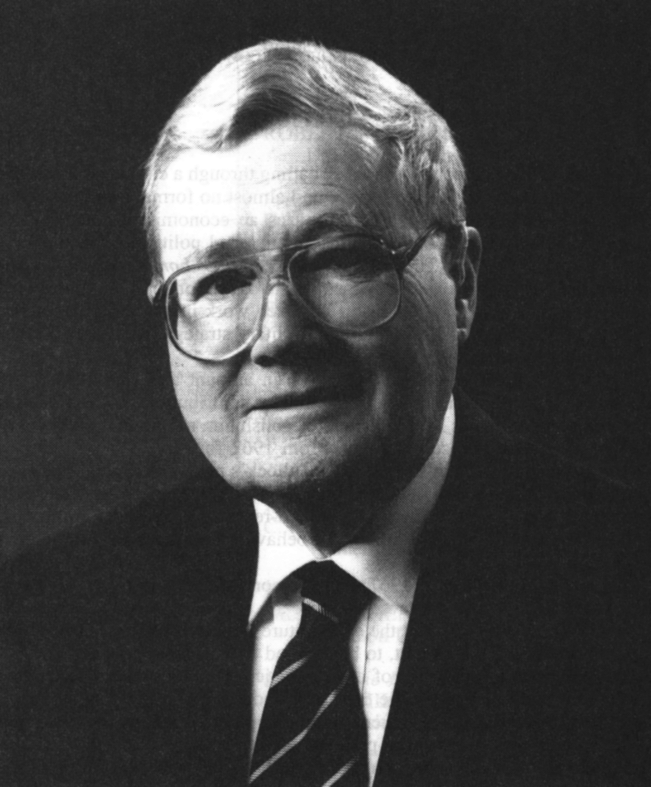Liberty Matters
Giving Thanks for Gordon
 Since it's the season of thanksgiving, I thought I'd give thanks for Gordon Tullock. Knowing Gordon, he'd say, "You're welcome," because only Gordon Tullock was responsible for Gordon Tullock.
Since it's the season of thanksgiving, I thought I'd give thanks for Gordon Tullock. Knowing Gordon, he'd say, "You're welcome," because only Gordon Tullock was responsible for Gordon Tullock.I've seen people compare Gordon to Gary Becker, with the idea being that both pushed the "economic man" model outside its traditional boundaries. There is something to that, but there are important differences.
Becker had three elements in his approach: maximizing, equilibrium, and stable preferences. He then used the economic model, using a comparative-statics approach based on changes in the cost of the activity, in the costs of substitute and complementary activities, and in income. He showed that apparently non-economic choices, such as fertility, education, marriage, and suicide, respond at the margin to essentially economic variables.
Tullock used only one of Becker's troika: maximization. He had no particular need of equilibrium because much (though not all) his work was on optimization by nonhumans, whether we are talking about coal tits (Tullock 1971) or bureaucrats (Tullock 1965).
Okay, that was a cheap shot, but it really does matter that price did not operate in the usual manner in the settings that Tullock investigated. The key variable was opportunity cost, and institutions determined how opportunity cost is counted in the calculus of the rational actor. The coal tit was a "careful shopper" in the sense that it has an optimal search pattern for nourishing grubs hiding in pine cones. Rather than using price, the birds need only be "hungry, lazy, and curious," usually continuing to search in places that have proved grub-dense, but sometimes looking elsewhere.
Earlier in this conversation, Pete Boettke said this about Tullock: "he encouraged an intellectual horse race between the persistent and consistent application of the economic way of thinking – the logic of choice, the situational logic of institutional analysis, and spontaneous-order theorizing – and all alternative theoretical frameworks." By looking at optimizing and noting that coal tits account for opportunity cost, Tullock was advancing an economic way of thinking even about evolved patterns of behavior.
Implicitly, of course, Tullock is also invoking Becker's third precept: stable preferences. But in the case of coal tits it is evolution, not choice, that is operating. Coal tits have their "hungry, lazy, and curious" worldview selected for them by natural selection and are not consciously considering alternative courses of action at all.
And in the case of bureaucrats, what is being selected for is precisely the absence of fixed preferences or principles because the measure of bureaucratic satisfaction is following the rules, whatever they are. Bureaucrats are people who possess a meta-preference: instead of doing what they like, they develop a facility for liking whatever it is they are told to do. (Tullock 1965, 391) Not everyone could do that, and that's why not everyone is suited for bureaucracy. It would be costly for someone with fixed ideological goals or policy preferences to work in a bureaucracy. And so they don't last long. Over time, bureaucracies are composed of those workers who can tolerate simply following instructions. That's actually what the economic way of thinking would predict because such people face the lowest opportunity costs.
Thus, there is a key difference between Becker and Tullock. Becker examines human choices at the margin in settings where markets have not generally been recognized. Tullock examined optimizing choices in settings where there are no markets (as in evolution) or where the workings of market incentives are largely suppressed (bureaucracy).
There is no reason to see markets everywhere. But optimizing is everywhere, and we can theorize about it. And that's why I'm thankful for Gordon.
References
Tullock, Gordon. 1965. The Politics of Bureaucracy. Washington D.C.: Public Affairs Press.
_________. 1971. "The Coal Tit as a Careful Shopper," The American Naturalist. 105 (941): 77-80.
_________. 1979. "Sociobiology and Economics." Atlantic Economic Journal. 7 (3): 1-10.
Copyright and Fair Use Statement
“Liberty Matters” is the copyright of Liberty Fund, Inc. This material is put on line to further the educational goals of Liberty Fund, Inc. These essays and responses may be quoted and otherwise used under “fair use” provisions for educational and academic purposes. To reprint these essays in course booklets requires the prior permission of Liberty Fund, Inc. Please contact oll@libertyfund.org if you have any questions.